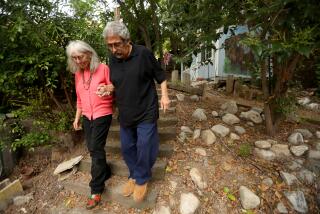Support Helps Alzheimer’s Care-Givers
- Share via
Research is pointing the way to improving the lives of those who shoulder the burden of caring for patients with Alzheimer’s disease.
Alzheimer’s disease is the most common cause of severe intellectual deterioration in the elderly and one of the leading causes of death in the United States.
With the nation’s elderly population rapidly growing, Alzheimer’s disease is taking a tremendous toll on both those who suffer from the disease and on those who care for them.
The illness usually lasts for many years. If the husband or wife of the Alzheimer’s patient is alive, he or she usually is the patient’s primary care-giver and takes the major responsibility for the patient’s care.
Among other problems, the care-giver has to cope with the patient’s bizarre behavior, inability to dress or bathe or control bodily functions. Ultimately, the patient cannot even recognize his or her own spouse.
The patient’s primary care-giver often has no one to turn to who understands what he or she is going through.
The spouse, generally also elderly, can become isolated and may feel overwhelmed by the burden of care-giving and may become physically or emotionally ill as a result.
Nevertheless, because of their long-standing relationships, people generally don’t want to place their husbands or wives in nursing homes.
New strategies are being developed that not only help to preserve the well-being of care-givers but also avert premature placement of patients in nursing homes.
One innovative approach is to have a trained counselor involved with every family care-giver from the time of the diagnosis. This establishes an immediate sense of support for the care-giver.
One federally sponsored research study is designed to evaluate the effectiveness of counseling and support for spouse care-givers of Alzheimer’s disease patients. Counselors maintain regular contact with all spouse care-givers over the entire course of the illness.
The results so far demonstrate that the availability of the counselor, the support of family members and use of community resources are crucial to maintaining patients at home and to maintaining the emotional and physical health of spouse care-givers.
In fact, the program may not only improve the ability of care-givers to cope with the illness but also may reduce nursing home placement of patients.






